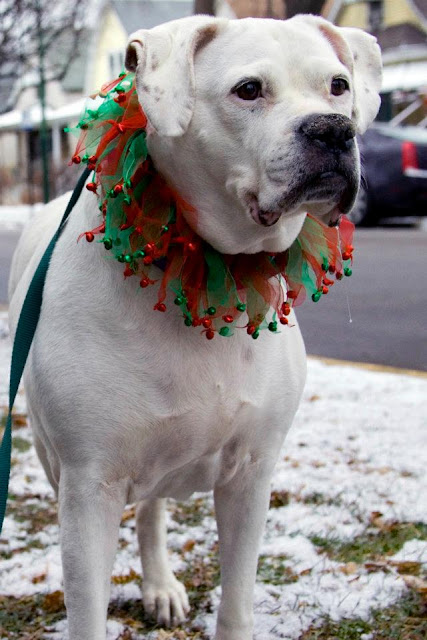New Leash on Life is committed to rescuing dogs that wouldn't be given another chance. We are known for rescuing elder bulls and medical cases, and Bessie fits the bill. She's a bit older and was waiting for us to grab her from ACC (Animal Care & Control), we couldn't pass that sweet face. Once we got her to our vet we had her thoroughly checked, we found out that Bessie may need some extra medical testing.
We originally just thought she was a big girl, more for everyone to love at a mere 98 pounds. However, we found that her weight trouble wasn't from overfeeding, it may be something more internally. Immediately our Medical Director along with the vet staff at VCA started blood tests to identify what could be troubling our girl. They noticed on external exam that her liver seemed enlarged, they also noticed that she was drinking LOTS of water and gobbling up her food. Because of these signs, we tested her liver for Cushings.
Cushings is hard to identify, many of the signs are also signs of older aging so many owners think that it's just their dog showing signs of age. The signs include: increased water intake, ravenous appetite, pot-bellied appearance, and hair loss. Cushings disease typically effects older dogs but it can appear as early as 5 years old and is mainly in smaller breeds, however, we test our larger dogs as well. Please note: Cushings does not show up in regular blood tests, and has to be specifically tested.
Bessie's liver results came back high, but not high enough for Cushings, it could be an early indicator, so we are treating it as a precautionary.
During testing, we noticed Bessie was developing bruising on her chest, just under the skin. This worried our Medical Director (because of earlier liver testing) and decided to get an ultrasound done, thankfully, nothing showed up on the ultrasound. Bessie also had a raging upper respiratory infection and tested positive for Lyme disease. Lyme disease is something that she is a carrier, however, doesn't necessarily HAVE it. She is currently on antibiotics for all, and we are running a PCR, the test that determines if her Lyme disease is active.
We are happy to report that Bessie's respiratory infection is all cleared up, her water intake has slowed down and she is being checked regularly for her liver levels. This shows that we may think we are taking a healthy dog, and further examination shows a pup that needs a lot of TLC.
While this post may seem sad, Bessie is no worse for the wear and is LOVING her new foster home with foster sister, Ms. M and foster brother, Mr. B of Two Pitties in the City. She is happy-go-lucky and feeling 100% better than when we first got her. We are so happy to have Bessie as a part of the NLOL family and can't wait to find her a forever home!
Bessie is currently on a weight loss diet and has lost 8 pounds! She is being fed Sojo's dehydrated fruits and veggies. For more information on her diet, check out: Bessie's Diet and for more information regarding adoption an elderbull, check out this post here: On the Secrets of Elderbulls.











